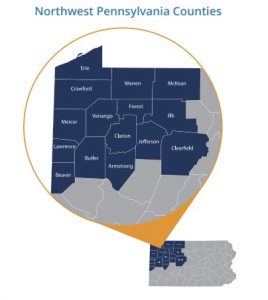About Face for PTSD and Mental Health
 The Northwest Pennsylvania (NW PA) Veteran Suicide Prevention Program operates on a three-pronged approach involving healthcare providers, community organizations, and Veterans and their families. The PA Department of Military and Veterans Affairs (DMVA) is an active partner and responsible for ensuring that the Program integrates current Veteran suicide prevention initiatives throughout the state of Pennsylvania. The following information about PTSD, mental health, and the About Face initiative is provided by the US Department of Veterans Affairs.
The Northwest Pennsylvania (NW PA) Veteran Suicide Prevention Program operates on a three-pronged approach involving healthcare providers, community organizations, and Veterans and their families. The PA Department of Military and Veterans Affairs (DMVA) is an active partner and responsible for ensuring that the Program integrates current Veteran suicide prevention initiatives throughout the state of Pennsylvania. The following information about PTSD, mental health, and the About Face initiative is provided by the US Department of Veterans Affairs.
Please reach out to us if you have any questions or would like to speak with someone about publicizing the NW PA Veteran Suicide Prevention Program in your community.
Read time: 4 minutes
About Face
Sometimes, when you experience a traumatic event — a car accident, an IED blast, military sexual trauma, or the death of a fellow Service member — that moment can continue to bother you weeks, months, and even years later.
That can mean reliving the event: constantly replaying it in your head. It can mean avoiding places or things that remind you of the experience. It can also mean nightmares, sleeplessness, or anxiety. You might feel numb or, conversely, feel hyperaware of your surroundings.
The symptoms and effects of posttraumatic stress disorder, commonly known as PTSD, can disrupt your everyday life. People with PTSD sometimes withdraw from their family members and friends. They can find it hard to concentrate, startle easily, and lose interest in things they used to care about. Some may try to dull their feelings by misusing alcohol or drugs.
AboutFace features the real stories of Veterans who have experienced PTSD, and their family members and VA clinicians. By watching the videos on AboutFace, you can learn about PTSD, explore treatment options, and get advice from others who have been there.
If you are bothered by thoughts and feelings from a trauma, you may wonder if you have PTSD. Taking a screening — either online or at a VA medical center (VAMC) — is a good idea. Only a mental health care provider can diagnose PTSD, but the screening can help you and your provider understand if you might benefit from treatment.
Looking to Get Involved?
 Whether you identify as a healthcare provider, community organization, or Veteran, there are several opportunities through the NW PA Veteran Suicide Prevention Program and PERU to connect to resources, participate in educational training, and promote harm reduction strategies. We are actively recruiting healthcare and community partners to work with us in meeting our goals and objectives. To learn more, visit the program website at theresilientveteran.org.
Whether you identify as a healthcare provider, community organization, or Veteran, there are several opportunities through the NW PA Veteran Suicide Prevention Program and PERU to connect to resources, participate in educational training, and promote harm reduction strategies. We are actively recruiting healthcare and community partners to work with us in meeting our goals and objectives. To learn more, visit the program website at theresilientveteran.org.
Need Help? Know Someone Who Does? Contact the National Suicide Prevention Lifeline at 988 or use the online Lifeline Crisis Chat. Both are free and confidential. You’ll be connected to a skilled, trained counselor in your area.

